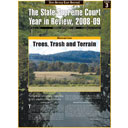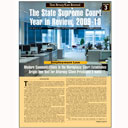Alan L Zegas
April 26, 2000 | Law.com
May It Please the CourtI recently had a law student named Ben intern in my office to see what it was like to be in private practice. Ben was there when I got the call from the Circuit clerk's office. We heard over the speakerphone: "I was just calling to tell you that the court cannot accept the brief you filed last week." "Oh, why's that?," I asked. The reply: "You used the correct 12-point type throughout your brief, but one footnote is set in 10-point type."
By Alan L. Zegas
8 minute read
August 30, 2002 | New Jersey Law Journal
Court Weighs In on Racially-Targeted Law EnforcementAs a result of racial profiling at long last being recognized as a serious problem on this state's highways, cases have begun filtering up to the Court dealing with racially targeted law enforcement and a corollary, the consent search.
By Alan L. Zegas
32 minute read
April 05, 2004 | New Jersey Law Journal
Hail to Our Newest CrimeA look at the use of the criminal process to handle those who conduct same-sex marriages.
By Alan L. Zegas
5 minute read
September 06, 2004 | New Jersey Law Journal
Court Paves the Way for Recorded ConfessionsThe Court's opinions this past term reflect a high level of agreement among the justices, confirming that this state's High Court, unlike the United States Supreme Court, does not have deep ideological divides. Of the 33 criminal cases decided, 22 opinions were unanimous.
By Alan L. Zegas
49 minute read

September 02, 2009 | New Jersey Law Journal
Court Expresses Displeasure for Plea Agreements Based on Faulty Advice and for The PolygraphThere was no single area of focus for the Court, but several cases this term dealt with defendants seeking to retract plea agreements based upon the alleged faulty advice of counsel. In one instance, a defendant claimed to have turned down a plea agreement because he received faulty sentencing advice from counsel.
By Alan L. Zegas
50 minute read
September 01, 2003 | New Jersey Law Journal
Drawing Bright Lines for the Role of the JuryIn the 2002-2003 term, the Supreme Court decided a wide span of issues, including juror disqualification; searches and seizures; DNA procurement applications; conflicts of interest on the part of both prosecutors and defense attorneys; child endangering; the admission of personality disorder evidence, of excited utterances and of prior wrongs; child pornography; self representation; the wearing of prison garb and restraints by testifying witnesses; jury instructions; sentencing; and others.
By Alan L. Zegas
67 minute read

September 02, 2008 | New Jersey Law Journal
The Ripple Effect on Testimonial StatementsThe Supreme Court's criminal docket this past term was one of the heaviest in recent memory with a special focus on testimonial statements, jury instructions, and search-and-seizure-related issues.
By Alan L. Zegas
66 minute read

August 31, 2011 | New Jersey Law Journal
Court Rings in New Standards for Eyewitness Identification and Sounds the Death Knell for Res GestaeWA trial court has no authority to deny defendants their constitutional right of confrontation merely because the court believes that cross-examination will be of little use.
By Alan L. Zegas
51 minute read

August 31, 2007 | New Jersey Law Journal
State Wins Three Fifth Amendment BattlesThe Supreme Court's 2006-2007 term produced a wealth of criminal cases in a variety of areas, including three important cases involving the Fifth Amendment.
By Alan L. Zegas
46 minute read

August 31, 2010 | New Jersey Law Journal
Justice Wallace Leaves His Mark: School Searches Subjected to a Standard Lower Than Probable CauseThough the Governor's decision to not reappoint Wallace was enmeshed in controversy, the decisions of Justice Wallace, this term as in prior ones, hardly reflect a jurist run amok. In one of the Court's milestone decisions this past term, he decided that a high school assistant principal's decision to search a student's automobile parked on school property was subject to a lower standard than probable cause.
By Alan L. Zegas
107 minute read
Trending Stories
- 1No Two Wildfires Alike: Lawyers Take Different Legal Strategies in California
- 2Poop-Themed Dog Toy OK as Parody, but Still Tarnished Jack Daniel’s Brand, Court Says
- 3Meet the New President of NY's Association of Trial Court Jurists
- 4Lawyers' Phones Are Ringing: What Should Employers Do If ICE Raids Their Business?
- 5Freshfields Hires Ex-SEC Corporate Finance Director in Silicon Valley



